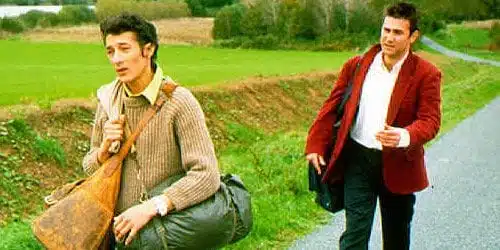
Someone once told me that any given story is just a variation on two possible plots. The less modification within those plots, the easier it is to tell your story, because your audience already knows where it’s going. These two plots are: “A boy meets a girl…”, and, “A boy leaves home…”.
Regardless of how true this hypothesis, it seems one that Manuel Poirier, co-writer (along with Jean-Fraçiose Goyet) and director of Western, would ascribe to. So much so, in fact, that the small modicum of plot in the Cannes-Jury-Prize-winning Western is just a mish-mash of both these ideas and the rest is left to the characters. His modification? Although the boy meets the girl, they don’t really interact – and though the boy leaves home, he doesn’t really get that far away – and it’s hard to even distinguish where “home” is.
Western opens with Paco (Sergi López, Pan’s Labyrinth), a Catalonian shoe salesman, having his car stolen in France by Nino (Sacha Bourdo, The Science of Sleep), a Russian emigrant by way of Italy (already establishing our characters’ lack of national identity). Because of Nino, Paco then loses his job; so when he sees Nino on the street, it’s not surprising the carjacker ends up hospitalized. The surprising part is Paco visiting the hospital and the two quickly becoming friends.
The speed of their fast-blossoming friendship is dwarfed only by the speed in which Paco falls in love with a local woman, Marinette (Élisabeth Vitali), during his unplanned stay in the town. But Marinette is aware how misleading Rom-Com feelings can be, so she forbids herself and Paco from communicating for three weeks so they can better assess their commitment to one another.
Now, without a car, a job, and a place to live, Paco is convinced by Nino to take a hitchhiking trip during his exile until he can triumphantly return to Marinette, proud and strong. Travelling the gorgeous Brittany region, the two bachelors find love, friendship, mischief and more love – all the usual suspects of a road movie, minus the endless miles of road. Though they both enjoy the trip, these two are so insecure on their journey, they can barely move anywhere without back-tracking.
This stagnation is a smart move by Poirier. This western region of France is beautiful enough without frequent scenery changes. And it allows his characters and his film room to breathe and develop. Not just stagnating his locations, Poirier extends shots a healthy length, his dialogue in many scenes appears unhurried, and his characters’ trials seem genuine and slow to resolve.
The film’s leisurely pace – the long takes of double-dating dinners, the tracking shots along the country routes and the oddly paced post-coital conversations – help define the film’s target: the unreliability of sexuality. Paco and Nino’s aimless drifting doesn’t stop geographically; it extends well into their psyches. Each of these scenes slowly unfold the veneer of seemingly secure, masculine Europeans. Nino’s insecurities about women become so apparent, the two start taking phony door-to-door surveys about “The Ideal Man” to help Nino meet someone.
And Paco has quite a different issue. As he’s been the one adding to Nino’s insecurities the whole trip by romancing every woman he meets. Though he’s having fun, we’re plagued, with each new woman, by images of Marionette. Paco seems more content with his position than we are. And it’s not until the end does he begin to fathom which direction his behaviors have been taking him.
Without a large, pressing narrative, more a collection of vignettes, Poirier is able to not only explore his characters and the western French countryside, but also his political leanings. Though not a “political film” in the strictest sense, it’s tough to argue against some level of socio-political implication of two multi-ethnic foreigners traipsing around idyllic western France, looking for stability. Such an argument becomes more difficult after our heroes befriend a paraplegic Ivorian (someone from Côte d’Ivoire), who has shouted at him, “Go back where you came from!” This is strikingly odd to us because he seems infinitely more at home in Brittany than our two vagabonds.
In American press books, the film is suggested to posit “social optimism”, delivering a message to France’s extreme right-wing. And yes, Peruvian-born, French-raised Poirier is planting the seeds of ethnic integration; this is especially obvious in the credits, where multiple flags are placed next to each name, representing heritage. But most of these claims are overstated and overemphasized, as the film’s best use of immigration is as a metaphor for our characters’ sexual journeys. Especially due to how the film ends.
Western’s final scenes revolve around perpetually mothering Nathalie (Marie Matheron), the last person the two encounter, and her effects on our travelers. After the love of her life left during her pregnancy, she became obsessed with child-bearing as a substitute for husbandry, and has since become a mother to many (many) children, all fathered by passing travelers. Both men find an immediate kinship with Nathalie, and although Paco and Nino have spent the entire film without a home, they immediately find one with her.
And though the symbolism is a bit contrived, as clearly they are in need of a mother (in addition to a motherland), Poirier’s simple direction pulls it off well, adding a level of genuineness to an otherwise cringe-worthy metaphor. The Catalonian and the Russian both get what they deserve in Nathalie, though they receive two very different things.
Poirier accomplishes his goals admirably. Although the film drags a bit and sometimes lapses into artifice (I’m looking at you, chainsaw scene), it’s hard to deny the likeability of our two, wayward, man-boy travelers. “A boy leaves home” and “A boy meets a girl”. Neither by themselves aptly describe Western. But together, they do a pretty good job.
